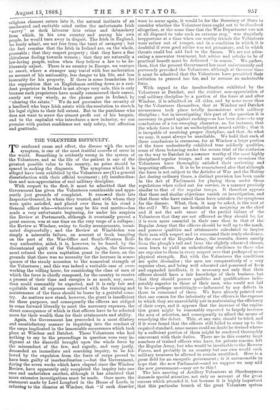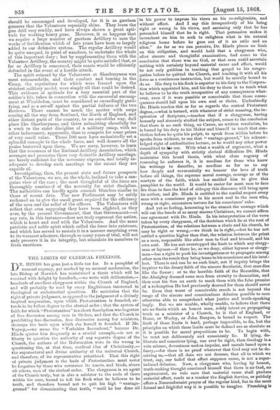THE VOLUNTEER MENICULTY.
TO confound cause and effect, the disease with the mere symptom, is one of the most fruitful sources of error in the world. Something is evidently wrong in the system of the Volunteers, and as the life of the patient is one of the greatest possible value to the country, no pains should be spared in making the diagnosis. The symptoms which it is alleged have been exhibited by the Volunteers are (1) a general dissatisfaction with their official treatment ; (2) insubordina- tion and non-appreciation of real military discipline.
With respect to the first, it must be admitted that the Government has given the Volunteers considerable and appa- rently just grounds of complaint. It removed their late Inspector-General, in whom they trusted, and with whom they were quite satisfied, and placed over them in his stead a General officer who—whatever may be his real merits—has made a very unfortunate beginning, for under his auspices the Review at Portsmouth, although it eventually proved a great success, was at one time on the very verge of a collapse ; the Review at Windsor, owing to faulty arrangements, termi- nated disgracefully ; and the Review at Wimbledon was simply a miserable failure, on account of fresh bungling on the part of the War-Office and South-Western Rail- way authorities, aided, it is, however, to be feared, by the discontented spirit of the Volunteers. Again, the Govern- ment refused the extra capitation grant to the force, on the grounds that there was no necessity for the increase in conse- quence of the steady accession to the numerical strength of the Volunteers ; and this was indeed a veritable case of over- working the willing horse, for considering the class of men of which the force is chiefly composed, for the country to receive a present of their time and energies is as much, nay, more, than could reasonably be expected, and it is only fair and equitable that all expenses connected with the training and maintenance of the force should be borne by a grateful coun- try. As matters now stand, however, the grant is insufficient for these purposes, and consequently the officers are obliged to come forward liberally to meet the necessary expenses, the direct consequence of which is that officers have to be selected more for their wealth than for their attainments and ability. Again, the Government has proceeded in a most dilatory and unsatisfactory manner in inquiring into the conduct of the corps implicated in the lamentable occurrences which took place at Windsor and Datchet. Those Volunteers who had nothing to say to the proceedings in question were very in- dignant at the discredit brought upon the whole force by the misconduct of the few, and eagerly, and very justly, demanded an immediate and searching inquiry, to be fol- lowed by the expulsion from the force of corps proved to have been guilty of insubordination .—but the Government, during the seven weeks which have elapsed since the Windsor Review, have apparently only completed the inquiry into one case and undertaken another, although it has admitted that more extensive investigations must be made. Once more, the statement made by Lord Longford in the House of Lords, in referring to the disaster at Windsor, that "if such disorder were to occur again, it would be for the Secretary of State to consider whether the Volunteer force ought not to be dissolved altogether, at the same time that the War Department was not at all disposed to take such an extreme step," was singularly inopportune at a time when our worthy friends the Volunteers were rather out of temper, and in a condition in which it is doubtful if even good advice was not premature, and in which threats could but add fuel to the flames. We are not advo- cating a rosewater treatment, but advice and rebuke to be of practical benefit must be delivered "in season." We gather, then, that the present Government has most unfortunately and perversely provoked the Volunteers, although at the same time it must be admitted that the Volunteers have permitted their irritation to proceed too far, and to assume an undesirable form.
With regard to the insubordination exhibited by the Volunteers at Datchet, and the evident non-appreciation of real military discipline by a portion of the force at and after Windsor, it is admitted on all sides, and by none more than by the Volunteers themselves, that at Windsor and Datchet occurrences took place totally inconsistent with military discipline ; but in investigating this part of the question it is necessary to guard against rushing—as has been done—to any conclusions of a too sweeping character, as, for instance, that the whole force is but an undisciplined armed rabble ; that it is incapable of receiving proper discipline, and that, do what we may, it must always be unreliable. We hold that each of these conclusions is erroneous, for at Windsor a large portion of the force undoubtedly exhibited true soldierly qualities, some of them behaving under the severe trial of the confusion. on the way to Datchet in a manner worthy of the most highly disciplined regular troops, and on many other occasions the Volunteers have thoroughly satisfied their reviewing and inspecting officers. It is to be remembered also that although the force is not subject to the Articles of War and the Mutiny Act during ordinary times, a distinct provision has been made in the Act of Parliament for placing them under these regulations when called out for service, in a manner precisely similar to that of the regular troops. It therefore appears that these and similar objections vanish on investigation, and that those who have raised them have mistaken the symptoms for the disease. What, then, it may be asked, is the root of the evil ? We have no hesitation in assigning as the chief and if not the sole cause of the partial failure of the Volunteers that they are not officered as they should be, for it is even more essential in their case than in that of the- Regular Army that the officers should be well up to the mark, and possess qualities and attainments calculated to inspire- their men with respect and to command their ready obedience. In the case of the Regular Army, the recruits, drawn mostly from the plough's tail and from the slightly educated classes, soon learn to yield an unhesitating obedience to those who are superior to them in every respect save that perhaps of mere physical strength. But with the Volunteers the conditions are quite dissimilar ; the men are comparatively of a very superior class, and being well educated and possessed of keerk and expanded intellects, it is necessary not only that their officers should have a fair knowledge of their business, but that they should possess qualities and qualifications indis- putably superior to those of their men, who would not fall to be — perhaps unwittingly — influenced by any defects in those in command of them. We have already pointed out that one reason for the inferiority of the officers is the expense to which they are unavoidablfput in maintaining the efficiency of their corps, and it appears that the increase of the capita- tion grant might be reasonably expected to largely increase the area of selection, and consequently to afford the means of remedying the defect. This, at any rate, should be tried, and if it were found that the officers still failed to come up to the required standard, some means could no doubt be devised where- by a sufficient portion of them might be rendered thoroughly conversant with their duties. There arc in this country large numbers of trained officers who have, for private reasons, left the Regular Army, but who would be invaluable to the Reserve Forces, and probably in no country but our own would such military treasures be allowed to remain unutilized. Here is a great field for an energetic government ; is it unreasonable to hope that the new Parliament—and we suppose we may add the new government—may see to this ? The late meeting of Artillery Volunteers at Shoeburyness demands special attention, not only on account of the great success which attended it, but because it is highly important that this particular branch of the great Volunteer system should be' encouraged and developed, for it is as garrison gunners that the Volunteers especially shine. They learn the gun drill very readily, and have always shown a great apti- tude for working heavy guns. Moreover, it so happens that we require a large number of garrison Artillery to man the works of fortification which of late years have been so largely added to our defensive system. The regular Artillery would be quite unequal, in point of numbers, to undertake the whole of this important duty ; but by supplementing them with the Volunteer Artillery, the country might be quite satisfied that, so far as Artillery is concerned, their coasts would be efficiently defended in the event of a hostile attack.
The spirit evinced by the Volunteers at Shoebuiyness was most commendable, and their conduct and bearing in the Camp, the regulations for which were framed upon the strictest military model, were simply all that could be desired. This evidence of aptitude for a very essential part of the soldier's life, taken in connection with the successful encamp- ment at Wimbledon, must be considered as exceedingly grati- fying, and as a set-off against the partial failures of the two Reviews. There cannot be much the matter with corps coining all the way from Scotland, the North of England, and other distant parts of the country, to an out-of-the way, dull place like Shoeburyness, and there submitting cheerfully for a week to the strict discipline of a military camp, with no other inducement, apparently, than to compete for some prizes of very small value. Those 700 men have undoubtedly set a splendid example to the whole force, and well deserve all the praise bestowed upon them. We are sorry, however, to learn that the resources of the National Artillery Association, which arranges and promotes these very desirable Artillery meetings, are barely sufficient for the necessary expenses, and totally in- adequate to develop such meetings to the extent they are capable of.
Investigating, then, the present state and future prospects of the Volunteers, we are, on the whole, inclined to take a san- guine view of the case ; the most thoughtful of the force are thoroughly convinced of the necessity for strict discipline. The authorities can hardly again commit blunders similar to those of recent date. The new Parliament may be safely reckoned on to give the small grant required for the efficiency of the men and the relief of the officers. The Volunteers will reflect that even supposing they have been slighted, as they aver, by the present Government, that that Government—at any rate, in this instance—does not truly represent the nation, which is heart and soul with the Volunteers. And the same patriotic and noble spirit which called the force into existence, and which has served to sustain it in a manner surprising even to its warmest admirers, through so many years of trial, will not only preserve it in its integrity, but stimulate its members to fresh exertions.































 Previous page
Previous page